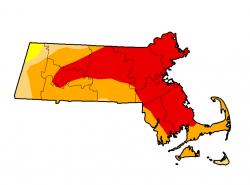2016 Drought Status and Related Information - Sonia Schloemann, UMass Extension Fruit Program
 Drought conditions during the fruit ripening period mean that growers must be prepared to irrigate their plantings. How much to irrigate depends somewhat on the soil type where the crop is growing (a silt loam will hold twice as much water as a sandy loam), the crop type (blueberries with shallow roots are more drought sensitive than grapes with deep roots), and also on the method of irrigation (drip irrigation looses less water to evaporation than does overhead irrigation). The rule of thumb for most fruit is to aim for 1-2" of water per week to support crop sizing and ripening at this time of year (July). There are many ways to calculate exact rates for all different combinations of crop, soil, and delivery system. See resource list below for this information. Be sure that you are using a clean water supply. And, if you are using a municipal water supply, be aware of water use restrictions that may apply. See here for current Massachusetts water use restriction map. See: http://droughtmonitor.unl.edu/Home/StateDroughtMonitor.aspx?MA
Drought conditions during the fruit ripening period mean that growers must be prepared to irrigate their plantings. How much to irrigate depends somewhat on the soil type where the crop is growing (a silt loam will hold twice as much water as a sandy loam), the crop type (blueberries with shallow roots are more drought sensitive than grapes with deep roots), and also on the method of irrigation (drip irrigation looses less water to evaporation than does overhead irrigation). The rule of thumb for most fruit is to aim for 1-2" of water per week to support crop sizing and ripening at this time of year (July). There are many ways to calculate exact rates for all different combinations of crop, soil, and delivery system. See resource list below for this information. Be sure that you are using a clean water supply. And, if you are using a municipal water supply, be aware of water use restrictions that may apply. See here for current Massachusetts water use restriction map. See: http://droughtmonitor.unl.edu/Home/StateDroughtMonitor.aspx?MA
Drought Damage Assistance Programs - State & Federal
Federal
- FSA Tree Assistance Program (access at the link Here)
- Small Business Administration Disaster Loans for Essex, Middlesex and Worcester counties information here
State
- MDAR Drought Emergency Loan Fund information here
Weather, Soil Moisture Assessment, Water Management and Irrigation Resources
Weather
- Northeast Regional Climate Center
- US Drought Monitor - Northeast
Soil Moisture Assessment
Water Management
Irrigation
- Drip Irrigation - An Introduction - Oregon State University
- Irrigation for Fruit and Vegetable Production - Pennsylvania State University
- Maintaining Irrigation Pumps, Motors, and Engines - ATTRA
- Energy Saving Tips for Irrigators - ATTRA
Apples
Apple Irrigation Model - NEWA
Blueberries
Irrigating Blueberries - MSU
Drought Stress in Blueberries - MSU
